一般将来时态讲解及练习和答案
- 格式:docx
- 大小:23.22 KB
- 文档页数:11
![[语法]初中英语一般将来时讲解与练习(含答案)](https://img.taocdn.com/s1/m/c26c830e17fc700abb68a98271fe910ef12dae32.png)
初中英语:一般将来时专项练习题1.People in Urumqi are glad that Subway Line One by the end of the year 2017.A.will complete B.will be completedC.has completed D.is completed【答案】B【解析】【详解】句意:乌鲁木齐的人们很高兴地铁1号线将在2017年底完工。
will complete将要完成,一般将来时态;will be completed一般将来时的被动语态;has completed现在完成时;is completed一般现在时的被动语态。
根据句意可知,that从句中的主语Subway Line One与动词complete构成被动关系,应使用被动语态。
再根据句中的时间状语by the end of the year 2017可知,这里用一般将来时态,故选B。
2.The 31th Olympic Games _______ in Rio de Janeiro of Brazil in 2016. A.is held B.will holdC.will be held D.is going to hold【答案】C【解析】【详解】试题分析:句意:第31届奥运会将于2016年在巴西里约热内卢举行。
举办奥运会,The 31th Olympic Games在句中作主语,用被动语态。
2016年将要发生的动作,用一般将来时态。
故选C。
【考点定位】:考查动词时态及语态辨析。
3.Half of the work _________ in two days.A.will finish B.will be finished C.have beenfinished D.has been finished【答案】B【解析】【详解】句意:这项工作的一半将在两天后完成。
考查被动语态。

初中英语:一般将来时专项练习题1.If we do something the law, we will .A.against; punished B.with; be punishedC.with; punished D.against; be punished【答案】D【解析】【详解】句意:如果我们做了违法的事,我们将被惩罚。
against反对;with 和…...一起;结合句意,我们做了违反法律的事,应被惩罚,主语we与谓语publish之间是被动关系,故用被动语态,位于助动词will 后,故用动词原形,故选D。
2.It is reported that a space station ______ on the moon in a few years. A.was built B.will be builtC.is built D.has been built【答案】B【解析】【详解】试题分析:句意:据报道,几年后月球上将要建空间站。
表示几年后将要发生的动作,用一般将来时态,主语space station是谓语动词build的承受者,用被动语态。
故选B。
考点:考查动词的时态、语态辨析。
3.The Olympic Games ______ in Tokyo in 2021.A.hold B.will hold C.are held D.will be held 【答案】D【解析】【详解】句意:奥运会将于2021年在东京举行。
考查被动语态。
hold一般现在时;will hold一般将来时;are held一般现在时的被动语态;will be held 一般将来时的被动语态。
根据“in 2022(将来的时间)”可知此句时态是一般将来时,可排除AC选项。
主语“The 24 Winter Olympics”是动词held的受动者,需使用被动语态,可知使用被动语态,故选D。
4.A new mobile cabin hospital(方舱医院) ________ next time you come here.A.is completed B.was completed C.completedD.will be completed【答案】D【解析】【详解】句意:下次你来这的时候,一个新的可移动方舱医院将会完工。
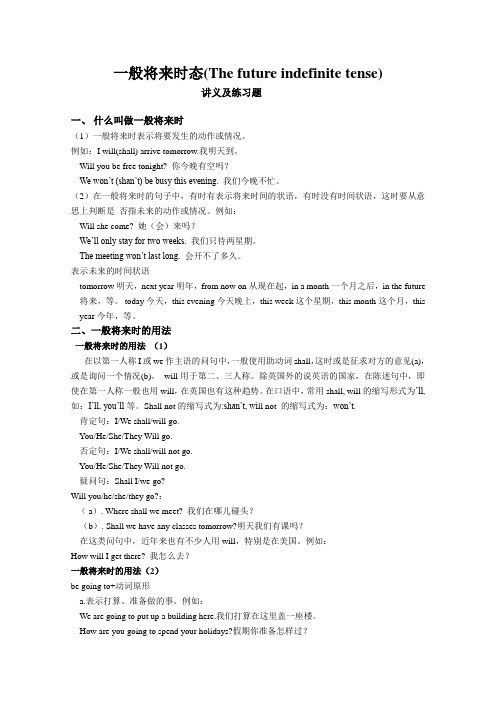
一般将来时态(The future indefinite tense)讲义及练习题一、什么叫做一般将来时(1)一般将来时表示将要发生的动作或情况。
例如:I will(shall) arrive tomorrow.我明天到。
Will you be free tonight? 你今晚有空吗?We won’t (shan’t) be busy this evening. 我们今晚不忙。
(2)在一般将来时的句子中,有时有表示将来时间的状语,有时没有时间状语,这时要从意思上判断是否指未来的动作或情况。
例如:Will she come? 她(会)来吗?We’ll only stay for two weeks. 我们只待两星期。
The meeting won’t last long. 会开不了多久。
表示未来的时间状语tomorrow明天,next year明年,from now on从现在起,in a month一个月之后,in the future 将来,等。
today今天,this evening今天晚上,this week这个星期,this month这个月,this year今年,等。
二、一般将来时的用法一般将来时的用法(1)在以第一人称I或we作主语的问句中,一般使用助动词shall,这时或是征求对方的意见(a),或是询问一个情况(b)。
will用于第二、三人称。
除英国外的说英语的国家,在陈述句中,即使在第一人称一般也用will,在英国也有这种趋势。
在口语中,常用shall, will的缩写形式为’ll, 如:I’ll, you’ll等。
Shall not的缩写式为:shan’t, wi ll not 的缩写式为:won’t.肯定句:I/We shall/will go.You/He/She/They Will go.否定句:I/We shall/will not go.You/He/She/They Will not go.疑问句:Shall I/we go?Will you/he/she/they go?:( a). Where shall we meet? 我们在哪儿碰头?(b). Shall we have any classes tomorrow?明天我们有课吗?在这类问句中,近年来也有不少人用will,特别是在美国。
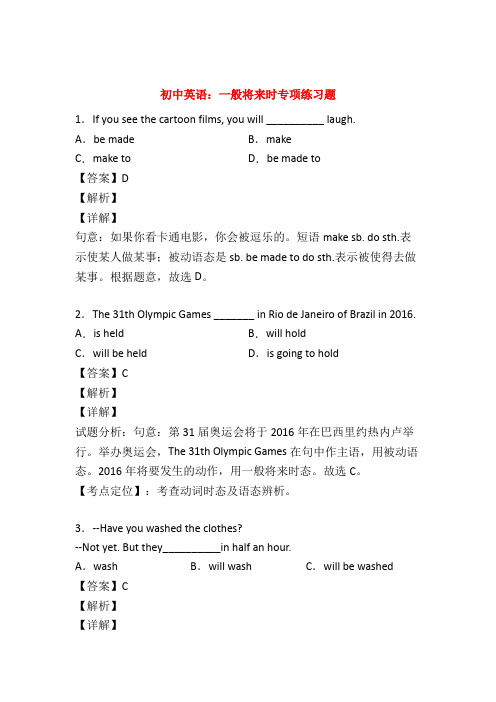
初中英语:一般将来时专项练习题1.If you see the cartoon films, you will __________ laugh.A.be made B.makeC.make to D.be made to【答案】D【解析】【详解】句意:如果你看卡通电影,你会被逗乐的。
短语make sb. do sth.表示使某人做某事;被动语态是sb. be made to do sth.表示被使得去做某事。
根据题意,故选D。
2.The 31th Olympic Games _______ in Rio de Janeiro of Brazil in 2016. A.is held B.will holdC.will be held D.is going to hold【答案】C【解析】【详解】试题分析:句意:第31届奥运会将于2016年在巴西里约热内卢举行。
举办奥运会,The 31th Olympic Games在句中作主语,用被动语态。
2016年将要发生的动作,用一般将来时态。
故选C。
【考点定位】:考查动词时态及语态辨析。
3.--Have you washed the clothes?--Not yet. But they__________in half an hour.A.wash B.will wash C.will be washed 【答案】C【解析】【详解】句意:——你洗衣服了吗?——还没有。
但是它们将在半小时之后被洗。
考查动词的被动语态。
wash动词原形;will wash一般将来时态形式;will be washed一般将来时态的被动语态形式。
联系上下语境并结合此句用的是现在完成时态,可知衣服还没有洗。
根据短语in half an hour,in+时间段,用在一般将来时中,意为“在…之后”,主语是“they”指的是衣服,所以此处应用一般将来时的被动语态,表示衣服将被洗。
一般将来时的被动语态构成是will+be+动词的过去分词,此空应填will be washed,故选C。

初中一般将来时态The Simple Future Tense精讲精练定义:一般将来时表示在将来某一时间将要发生的动作或存在的状态,也可表示将来某一段时间内经常发生的动作或存在的状态。
举例eg1:She will go to the park tomorrow.她明天将去公园。
eg2: What are you going to do this evening?你今天晚上将要干什么?eg3: I am going to do my lessons.我将要去上课了。
与一般将来时连用的时间状语tomorrow 明天the day after tomorrow 后天next week 下周soon 很快in the future 在未来some day某天in three days 三天后(in+一段时间多久之后)一般将来时结构will /shall +动词原形be going to +动词原形eg1: Spring will come again.eg2: Is there going to be a party tomorrow evening?一般将来时的各种句型1.肯定句:主语+shall/will+动词They will go shopping this afternoon.We shall be there before dark.2.否定句:主语+shall/will+not+动词They will go shopping this afternoon.We shall not be there before dark.3.一般疑问句:shall/will+主语+动词?Will they go shopping this afternoon?Shall we be there before dark?4.特殊疑问句:特殊疑问词+shall/will+主语+动词?When will they go shopping?What shall I do?5.there be的将来时:there will be+….There will be a show in the park tonight.练习:1.我明天要去看望我的奶奶。

初中英语:一般将来时专项练习题1.Teenagers _________ to look after themselves from a young age. A.should educate B.should be educated C.shouldn’t be educated D.not should educate【答案】B【解析】【详解】句意:青少年应该接受教育,从小就照顾自己。
考查被动语态。
should应该,后接原形动词;本句主语teenagers青少年,是动词educate 的受动者,需用被动语态,可排除AD选项。
根据句意语境,可知本句是肯定意义,故选B。
2.-The Big Parade(大阅兵) in Russia has made a big hit in the world and another one on September 3rd, 2015,in China.-Yes, I can't wait to meet the excitement.A.was held B.is heldC.has been held D.will be held【答案】D【解析】【详解】试题分析:句意:——俄国的大阅兵在世界上取得了很大成功,并且又一次大阅兵将在2015年九月三日在中国举行。
——我迫不及待地要满足兴奋。
根据语意句子用一般将来时的被动语态,故答案选D。
考点:考查时态和语态。
3.--- A new shopping mall ______ next year in our town.--- Really? It is wonderful! I needn’t go far away to buy things.A.is built B.has built C.will build D.will be built 【答案】D【解析】【详解】句意:——一家新的购物商场将于明年建在我们的家乡。

初中英语:一般将来时专项练习题1.Who will ________ to ________ at tomorrow’s meeting by the teacher?A.be told; say B.be asked; speak C.be told; talkD.be asked; tell【答案】B【解析】【详解】句意:在明天的会议上谁将被老师要求发言?考查动词辨析。
被要求发言,故用be asked;tell指告诉,speak指发言、演讲,故用speak。
故选B。
2.-The Big Parade(大阅兵) in Russia has made a big hit in the world and another one on September 3rd, 2015,in China.-Yes, I can't wait to meet the excitement.A.was held B.is heldC.has been held D.will be held【答案】D【解析】【详解】试题分析:句意:——俄国的大阅兵在世界上取得了很大成功,并且又一次大阅兵将在2015年九月三日在中国举行。
——我迫不及待地要满足兴奋。
根据语意句子用一般将来时的被动语态,故答案选D。
考点:考查时态和语态。
3.A hanfu show in Museum of History next week.A.is held B.was held C.will be held D.has been held【答案】C【解析】【详解】句意:汉服表演下周将在历史博物馆举行。
考查动词语态辨析。
next week下周,用于一般将来时;show是动词hold(举行)的受动者,需用被动语态,可排除ABD三项。
根据句意结构,可知选C。
4.Some new schools in Nanjing in the near future, which satisfies the citizens'needs for more resources.A.were built B.are built C.will build D.will be built 【答案】D【解析】【详解】句意:在不久的将来,南京将新建一些学校,这将满足市民对更多资源的需求。
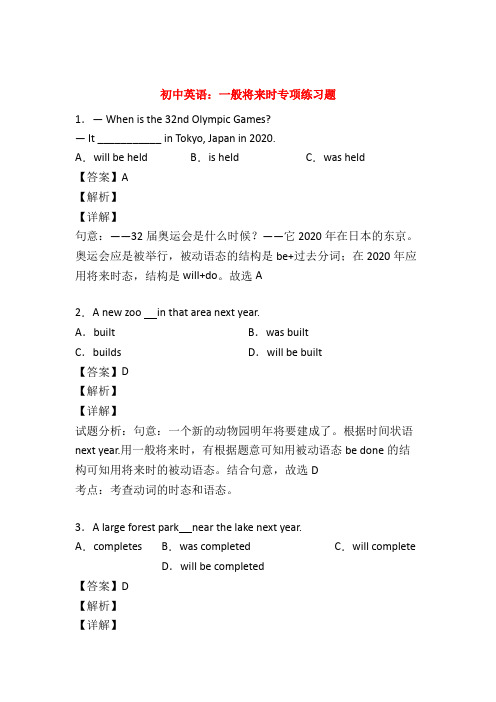
初中英语:一般将来时专项练习题1.— When is the 32nd Olympic Games?— It ___________ in Tokyo, Japan in 2020.A.will be held B.is held C.was held【答案】A【解析】【详解】句意:——32届奥运会是什么时候?——它2020年在日本的东京。
奥运会应是被举行,被动语态的结构是be+过去分词;在2020年应用将来时态,结构是will+do。
故选A2.A new zoo in that area next year.A.built B.was builtC.builds D.will be built【答案】D【解析】【详解】试题分析:句意:一个新的动物园明年将要建成了。
根据时间状语next year.用一般将来时,有根据题意可知用被动语态be done的结构可知用将来时的被动语态。
结合句意,故选D考点:考查动词的时态和语态。
3.A large forest park near the lake next year.A.completes B.was completed C.will completeD.will be completed【答案】D【解析】【详解】句意:明年森林公园附近将建成一座大的森林公园。
考查动词时态。
A. completes一般现在时;B. was completed一般过去时的被动语态;C. will complete一般将来时;D. will be completed 一般将来时的被动语态。
根据next year可知此句时态是一般将来时,根据句意可知主语和动词是被动语态,故此句是一般将来时的被动语态;故选D。
4.We are very pleased to know that our school library ________ in only a few days.A.is decorating B.has decorating C.is decoratedD.will be decorated【答案】D【解析】【详解】句意:我们很高兴知道我们的学校图书馆将在几天后进行装潢。
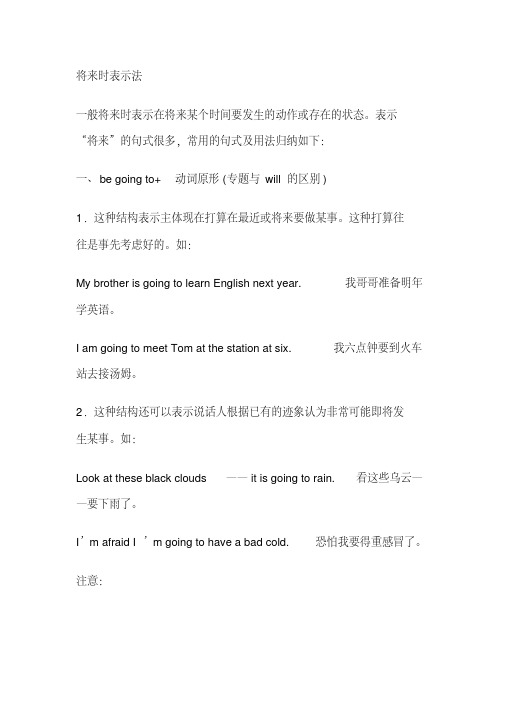
将来时表示法一般将来时表示在将来某个时间要发生的动作或存在的状态。
表示“将来”的句式很多,常用的句式及用法归纳如下:一、be going to+动词原形(专题与will的区别)1.这种结构表示主体现在打算在最近或将来要做某事。
这种打算往往是事先考虑好的。
如:My brother is going to learn English next year. 我哥哥准备明年学英语。
I am going to meet Tom at the station at six. 我六点钟要到火车站去接汤姆。
2.这种结构还可以表示说话人根据已有的迹象认为非常可能即将发生某事。
如:Look at these black clouds——it is going to rain. 看这些乌云——要下雨了。
I’m afraid I’m going to have a bad cold. 恐怕我要得重感冒了。
注意:1. 如果be going to后接的是形容词或副词(there)时,其后应加上be,然后再接形容词或副词。
如:I’m going to be busy this Sunday. 这个星期天我很忙2. there be句型也可用于这种句型中,但there不能和have连用。
如:There is going to be an English film this evening. 今天晚上有一场英文电影。
二、shall/ will+动词原形。
在书面语中,第一人称常用shall, 但在口语中,所有人称都可用will.1.will/ shall均可表示单纯的将来。
如:The radio says it will be cloudy tomorrow. 收音机报道明天多云。
2.表示预料中将要发生的动作或情况。
如:You’ll feel better after having this medicine.吃了这药,你就会感到好些的。

初中英语:一般将来时专项练习题1.The 24th Winter Olympic Games _____ in Beijing and Zhangjiakou in 2022, from February 4 th to 20th.A.is going to hold B.hold C.will be heldD.is held【答案】C【解析】【详解】句意:第24届冬奥会将于2022年2月4日至20日在北京和张家口举行。
考查一般将来时的被动语态。
由句中的in 2022可知时态用一般将来时,分析题干可知本句的主语The 24th Winter Olympic Games 是动作hold的承受者,所以应用被动语态;一般将来时的被动语态构成为:主语+will be+动词过去分词,hold的过去分词是held,故答案选C。
2.【四川省乐山市2015年中考英语试题】 The 2016 Olympic Games ______in Rio de Janeiro, Brazil. I’m looking forward to it.A.will hold B.is holding C.will be held【答案】C【解析】【详解】试题分析:句意:2016年奥运会将在巴西里约热内卢举行,我盼望着奥运会。
奥运会将于2016年举行,用一般将来时态,主语Olympic Games是谓语动词hold的承受者,用被动语态。
故选C。
【考点定位】考查动词的时态及语态辨析。
3.Different kinds of clothes ________ delivered to the earthquake-hit area tomorrow.A.will be B.had been C.were D.are【答案】A【解析】【详解】句意:不同种类的衣服明天将寄到地震区。
考查时态、语态。
根据时间状语tomorrow判断句子用一般将来时,主语different kinds of clothes是动作的承受着,判断用被动语态;一般将来时、被动语态的谓语动词的构成是“will +be +过去分词”,故选A。
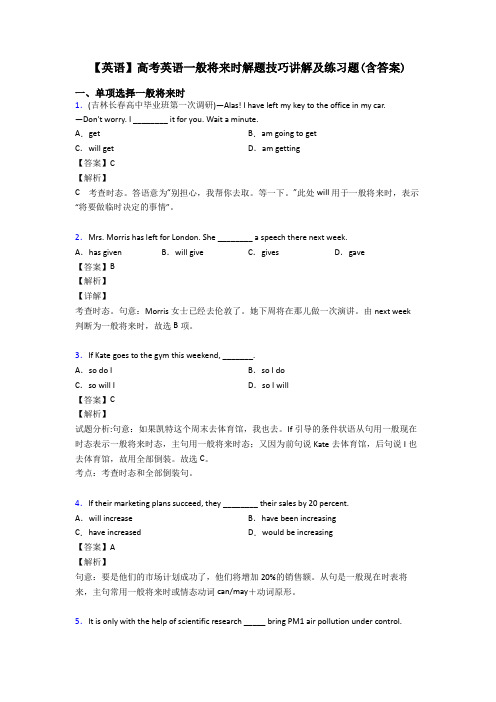
【英语】高考英语一般将来时解题技巧讲解及练习题(含答案)一、单项选择一般将来时1.(吉林长春高中毕业班第一次调研)—Alas! I have left my key to the office in my car.—Don't worry. I ________ it for you. Wait a minute.A.get B.am going to getC.will get D.am getting【答案】C【解析】C考查时态。
答语意为“别担心,我帮你去取。
等一下。
”此处will用于一般将来时,表示“将要做临时决定的事情”。
2.Mrs. Morris has left for London. She ________ a speech there next week.A.has given B.will give C.gives D.gave【答案】B【解析】【详解】考查时态。
句意:Morris女士已经去伦敦了。
她下周将在那儿做一次演讲。
由next week 判断为一般将来时,故选B项。
3.If Kate goes to the gym this weekend, _______.A.so do I B.so I doC.so will I D.so I will【答案】C【解析】试题分析:句意:如果凯特这个周末去体育馆,我也去。
If引导的条件状语从句用一般现在时态表示一般将来时态,主句用一般将来时态;又因为前句说Kate去体育馆,后句说I也去体育馆,故用全部倒装。
故选C。
考点:考查时态和全部倒装句。
4.If their marketing plans succeed, they ________ their sales by 20 percent.A.will increase B.have been increasingC.have increased D.would be increasing【答案】A【解析】句意:要是他们的市场计划成功了,他们将增加20%的销售额。
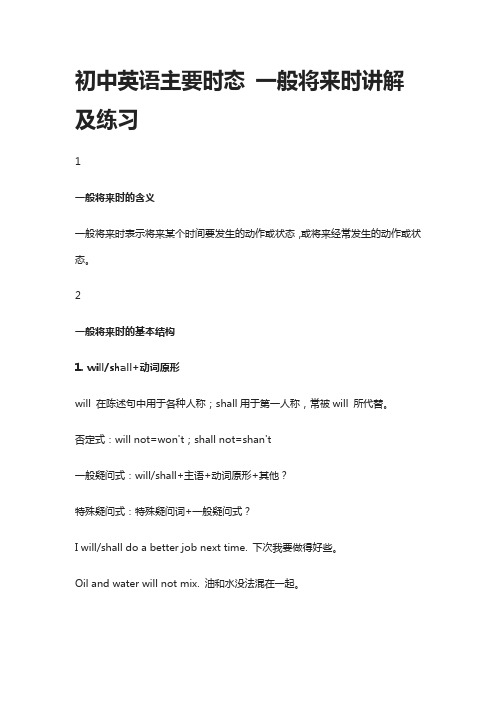
初中英语主要时态一般将来时讲解及练习1一般将来时的含义一般将来时表示将来某个时间要发生的动作或状态,或将来经常发生的动作或状态。
2一般将来时的基本结构1. will/shall+动词原形will 在陈述句中用于各种人称;shall用于第一人称,常被will 所代替。
否定式:will not=won't;shall not=shan't一般疑问式:will/shall+主语+动词原形+其他?特殊疑问式:特殊疑问词+一般疑问式?I will/shall do a better job next time. 下次我要做得好些。
Oil and water will not mix. 油和水没法混在一起。
—Will he help you with your English tonight? 今天晚上他会帮助你学习英语吗?—Yes, he will./No, he won't. 是的,他会。
/不,他不会。
—When will you arrive for America? 你什么时候去美国?—Tomorrow. 明天。
2. am/is/are going to +动词原形否定式:am/is/are not going to +动词原形一般疑问式:am/is/are +主语+ going to + 动词原形+其他?特殊疑问式:特殊疑问词+一般疑问式?He is going to spend his holidays in London. 他打算在伦敦度假。
Look at the dark clouds. There is going to be a storm. 看那乌云,快要下雨了。
Is he going to collect any data for us? 他会帮我们收集数据吗?What are you going to do tomorrow? 明天你打算作什么?3一般将来时的用法will+动词原形与am/is/are going to +动词原形的用法虽然都表示将来发生动作或情况,一般情况下能互换。
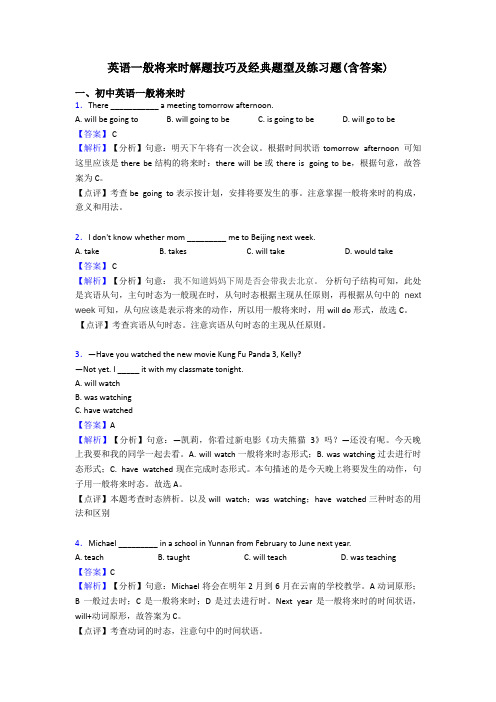
英语一般将来时解题技巧及经典题型及练习题(含答案)一、初中英语一般将来时1.There ___________ a meeting tomorrow afternoon.A. will be going toB. will going to beC. is going to beD. will go to be【答案】 C【解析】【分析】句意:明天下午将有一次会议。
根据时间状语tomorrow afternoon 可知这里应该是there be结构的将来时:there will be或there is going to be,根据句意,故答案为C。
【点评】考查be going to表示按计划,安排将要发生的事。
注意掌握一般将来时的构成,意义和用法。
2.I don't know whether mom _________ me to Beijing next week.A. takeB. takesC. will takeD. would take【答案】 C【解析】【分析】句意:我不知道妈妈下周是否会带我去北京。
分析句子结构可知,此处是宾语从句,主句时态为一般现在时,从句时态根据主现从任原则,再根据从句中的next week可知,从句应该是表示将来的动作,所以用一般将来时,用will do形式,故选C。
【点评】考查宾语从句时态。
注意宾语从句时态的主现从任原则。
3.—Have you watched the new movie Kung Fu Panda 3, Kelly?—Not yet. I _____ it with my classmate tonight.A. will watchB. was watchingC. have watched【答案】A【解析】【分析】句意:—凯莉,你看过新电影《功夫熊猫3》吗?—还没有呢。
今天晚上我要和我的同学一起去看。
A. will watch一般将来时态形式;B. was watching过去进行时态形式;C. have watched现在完成时态形式。

一般将来时讲解及练习(含答案)一、单项选择一般将来时1.— Mr. Gordon asked me to remind you of the meeting this afternoon. Don't you forget it!— Ok, I .A.won't B.don't C.will D.do【答案】A【解析】试题分析:考查时态。
句意:—戈登先生要求我提醒他今天下午要开会。
你千万别忘记了!—好的,我不会忘记的。
根据句意说明使用否定式,而且是说明的以后的事情,要使用将来时。
故A正确。
考点:考查时态2.—Did you tell your parents about the result?—Oh, no, I forgot. I them now.A.will be calling B.will call C.am going to tell D.am to call【答案】B【解析】句意:A 选项是将来进行时,表示将来某个时间正在进行的动作;B、C、D均表示一般将来时。
will+v原形表示临时决定的;而be going to do和be to do是表示按计划或安排要做的事。
根据语境可知说话人是经别人提醒才临时想起要把结果告诉他父母,所以应该用will+v原形。
句意:--你告诉你父母结果了吗?--没有,我忘了。
我现在就去告诉他们。
试题分析:考查动词时态。
考点:考查动词时态。
3.If my brother doesn’t go to the evening party, .A.neither do I B.I will either C.either will I D.nor will I【答案】D【解析】试题分析:考查倒装句:句意:如果我弟弟不去晚会,我也不去。
Neither/Nor+倒装句,表示“…也不是”,因为if条件句用一般现在时,代替一般将来时,所以主句是一般将来时,选D。
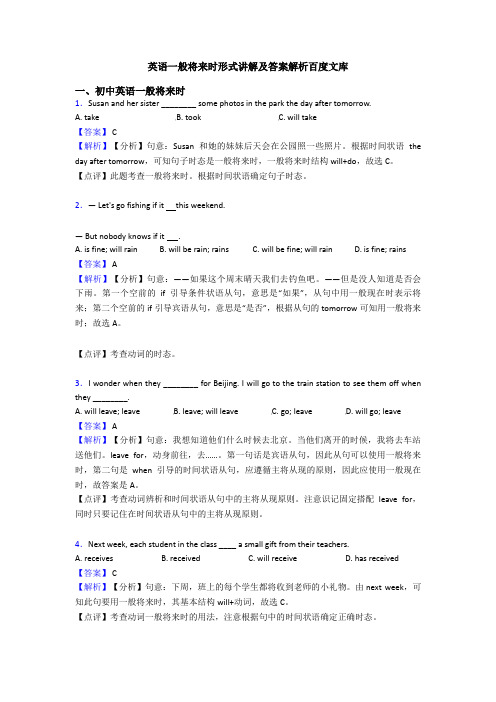
英语一般将来时形式讲解及答案解析百度文库一、初中英语一般将来时1.Susan and her sister ________ some photos in the park the day after tomorrow.A. takeB. tookC. will take【答案】 C【解析】【分析】句意:Susan和她的妹妹后天会在公园照一些照片。
根据时间状语the day after tomorrow,可知句子时态是一般将来时,一般将来时结构will+do,故选C。
【点评】此题考查一般将来时。
根据时间状语确定句子时态。
2.— Let's go fishing if it this weekend.— But nobody knows if it .A. is fine; will rainB. will be rain; rainsC. will be fine; will rainD. is fine; rains 【答案】 A【解析】【分析】句意:——如果这个周末晴天我们去钓鱼吧。
——但是没人知道是否会下雨。
第一个空前的if引导条件状语从句,意思是“如果”,从句中用一般现在时表示将来;第二个空前的if引导宾语从句,意思是“是否”,根据从句的tomorrow可知用一般将来时;故选A。
【点评】考查动词的时态。
3.I wonder when they ________ for Beijing. I will go to the train station to see them off when they ________.A. will leave; leaveB. leave; will leaveC. go; leaveD. will go; leave【答案】 A【解析】【分析】句意:我想知道他们什么时候去北京。
当他们离开的时候,我将去车站送他们。
leave for,动身前往,去……。
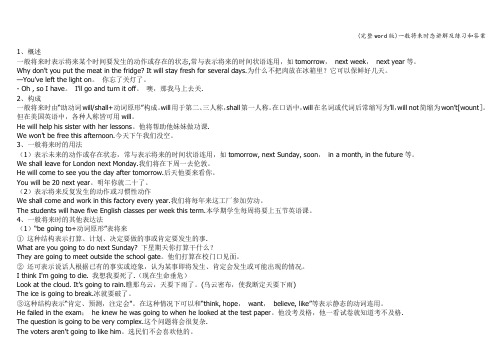
1、概述一般将来时表示将来某个时间要发生的动作或存在的状态,常与表示将来的时间状语连用,如tomorrow,next week,next year等。
Why don’t you put the meat in the fridge? It will stay fresh for several days.为什么不把肉放在冰箱里?它可以保鲜好几天。
—You’ve left the light on。
你忘了关灯了。
- Oh , so I have。
I'll go and turn it off。
噢,那我马上去关.2、构成一般将来时由“助动词will/shall+动词原形”构成。
will用于第二、三人称,shall第一人称。
在口语中,will在名词或代词后常缩写为’ll,will not简缩为won’t[wount]。
但在美国英语中,各种人称皆可用will。
He will help his sister with her lessons。
他将帮助他妹妹做功课.We won’t be free this afternoon.今天下午我们没空。
3、一般将来时的用法(1)表示未来的动作或存在状态,常与表示将来的时间状语连用,如tomorrow, next Sunday, soon,in a month, in the future等。
We shall leave for London next Monday.我们将在下周一去伦敦。
He will come to see you the day after tomorrow.后天他要来看你。
You will be 20 next year。
明年你就二十了。
(2)表示将来反复发生的动作或习惯性动作We shall come and work in this factory every year.我们将每年来这工厂参加劳动。
The students will have five English classes per week this term.本学期学生每周将要上五节英语课。
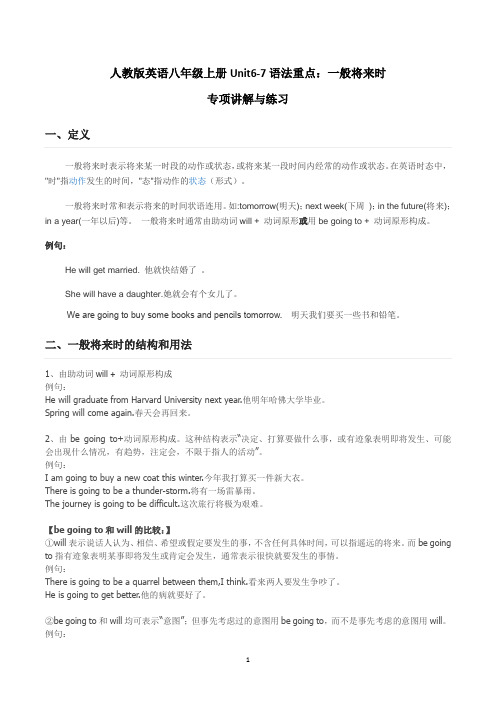
人教版英语八年级上册Unit6-7语法重点:一般将来时专项讲解与练习一般将来时表示将来某一时段的动作或状态,或将来某一段时间内经常的动作或状态。
在英语时态中,"时"指动作发生的时间,"态"指动作的状态(形式)。
一般将来时常和表示将来的时间状语连用。
如:tomorrow(明天);next week(下周);in the future(将来);in a year(一年以后)等。
一般将来时通常由助动词will + 动词原形或用be going to + 动词原形构成。
例句:He will get married. 他就快结婚了。
She will have a daughter.她就会有个女儿了。
We are going to buy some books and pencils tomorrow. 明天我们要买一些书和铅笔。
1、由助动词will + 动词原形构成例句:He will graduate from Harvard University next year.他明年哈佛大学毕业。
Spring will come again.春天会再回来。
2、由be going to+动词原形构成。
这种结构表示“决定、打算要做什么事,或有迹象表明即将发生、可能会出现什么情况,有趋势,注定会,不限于指人的活动”。
例句:I am going to buy a new coat this winter.今年我打算买一件新大衣。
There is going to be a thunder-storm.将有一场雷暴雨。
The journey is going to be difficult.这次旅行将极为艰难。
【be going to和will的比较:】①will表示说话人认为、相信、希望或假定要发生的事,不含任何具体时间,可以指遥远的将来。
而be going to指有迹象表明某事即将发生或肯定会发生,通常表示很快就要发生的事情。

人教版英语八年级上册Unit6-7语法重点:一般将来时专项讲解与练习一般将来时表示将来某一时段的动作或状态,或将来某一段时间内经常的动作或状态。
在英语时态中,"时"指动作发生的时间,"态"指动作的状态(形式)。
一般将来时常和表示将来的时间状语连用。
如:tomorrow(明天);next week(下周);in the future(将来);in a year(一年以后)等。
一般将来时通常由助动词will + 动词原形或用be going to + 动词原形构成。
例句:He will get married. 他就快结婚了。
She will have a daughter.她就会有个女儿了。
We are going to buy some books and pencils tomorrow. 明天我们要买一些书和铅笔。
1、由助动词will + 动词原形构成例句:He will graduate from Harvard University next year.他明年哈佛大学毕业。
Spring will come again.春天会再回来。
2、由be going to+动词原形构成。
这种结构表示“决定、打算要做什么事,或有迹象表明即将发生、可能会出现什么情况,有趋势,注定会,不限于指人的活动”。
例句:I am going to buy a new coat this winter.今年我打算买一件新大衣。
There is going to be a thunder-storm.将有一场雷暴雨。
The journey is going to be difficult.这次旅行将极为艰难。
【be going to和will的比较:】①will表示说话人认为、相信、希望或假定要发生的事,不含任何具体时间,可以指遥远的将来。
而be going to指有迹象表明某事即将发生或肯定会发生,通常表示很快就要发生的事情。
1、概述一般将来时表示将来某个时间要发生的动作或存在的状态,常与表示将来的时间状语连用,如tomorrow, next week, next year等。
Why don’t you put the meat in the fridge? It will stay fresh for several days.为什么不把肉放在冰箱里?它可以保鲜好几天。
-You've left the light on. 你忘了关灯了。
- Oh , so I have. I'll go and turn it off. 噢,那我马上去关。
2、构成一般将来时由“助动词will/shall+动词原形”构成。
will用于第二、三人称,shall第一人称。
在口语中,will在名词或代词后常缩写为'll,will not简缩为won’t[wount]。
但在美国英语中,各种人称皆可用will。
He will help his sister with her lessons.他将帮助他妹妹做功课。
We won't be free this afternoon.今天下午我们没空。
3、一般将来时的用法(1)表示未来的动作或存在状态,常与表示将来的时间状语连用,如tomorrow, next Sunday, soon, in a month, in the future等。
We shall leave for London next Monday.我们将在下周一去伦敦。
He will come to see you the day after tomorrow.后天他要来看你。
You will be 20 next year.明年你就二十了。
(2)表示将来反复发生的动作或习惯性动作We shall come and work in this factory every year.我们将每年来这工厂参加劳动。
The students will have five English classes per week this term.本学期学生每周将要上五节英语课。
4、一般将来时的其他表达法(1)“be going to+动词原形”表将来①这种结构表示打算、计划、决定要做的事或肯定要发生的事。
What are you going to do next Sunday? 下星期天你打算干什么?They are going to meet outside the school gate.他们打算在校门口见面。
②还可表示说话人根据已有的事实或迹象,认为某事即将发生、肯定会发生或可能出现的情况。
I think I'm going to die. 我想我要死了。
(现在生命垂危)Look at the cloud. It’s going to rain.瞧那乌云,天要下雨了。
(乌云密布,使我断定天要下雨)The ice is going to break.冰就要破了。
③这种结构表示“肯定、预测,注定会”。
在这种情况下可以和“think, hope, want, believe, like”等表示静态的动词连用。
He failed in the exam; he knew he was going to when he looked at the test paper.他没考及格,他一看试卷就知道考不及格。
The question is going to be very complex.这个问题将会很复杂。
The voters aren’t going to like him.选民们不会喜欢他的。
④be going to 和will的区别a. will表示说话人认为、相信、希望或假定要发生的事,不含任何具体的时间,可以指遥远的将来;而be going to 指有迹象表明某事即将发生或肯定发生,通常指很快就要发生的事情。
Listen to the wind. We are going to have a rough crossing.听那风声,我们横渡时一定困难很大。
He is gong to get better.他的病就会好了。
(指有恢复的迹象)b. be gong to 和will均可表示意图,但事先考虑过的意图用be going to,不是事先考虑过的意图用will。
-Why have you torn the paper into pieces?你怎么把论代撕了?- I am going to rewrite it.(事先考虑,不用will)我要重写。
-Is it really a big stone?-I will help you to move it.(未经事先考虑,不用be going to )He will go his own way.他一意孤行。
I won't do so.我不愿这样做。
c. be going to可以用在条件状语从句中表示将来,而will不能。
If you are going to attend the meeting, you’d better leave now.如果你要去参加这个会,你最好现在走。
(不用will)If you are going to accept the job, start to work now.如果你想接受这项工作,从现在开始上班。
(不用will)(2)用现在进行时来表示将来①现在进行时表示按计划、安排即将发生的动作,这一结构常用于表示位置转移的动词,如come , go , leave, start ,move, arrive等,还有join, play, eat, work, return, take, wear, stay, sleep, meet等。
常与表示将来的时间状语连用。
I'm leaving for Tibet on Sunday.星期天我要去西藏。
When are you going back to your factory? 你什么时候回工厂?He is not coming.他不来了。
They are arriving tomorrow afternoon.他们明天下午到达。
②进行时表示将来与be going to 的区别be going to表示说话前事先考虑过的意图(intend),现在进行时表示事先安排的动作(plan);表示有迹象表明某事即将发生或肯定发生用be going to,不用现在进行时。
Mary and Jane are going to meet tonight.(have an intention to)Mary and Jane are meeting tonight.( 事先安排的动作)I feel dizzy, I think I am going to faint.(不能用I fainting)我感到头晕,我想我要昏倒。
(3)“be about to+动词原形”表将来“be about to+动词原形”表示打算或据安排即将发生的动作。
它不与表示时间的副词或其他时间状语连用。
The English evening is about to start.英语晚会即将开始。
They are about to set out.(不能说,They are about to set out soon) 他们就要出发。
The ship is about to sail.轮船马上就要启航。
比较:be about to 与be not about to 的差异be about to 意为“正要、马上就”;be not about to 意为“不愿意……”。
He is about to come out. Please wait a moment.他马上就出来,请稍等。
He is not about to do that again.他不愿再做那件事了。
(4)“be to+动词原形”表将来“be to+动词原形”表示约定的、计划中的或按职责、义务要求要发生的动作,这种动作通常是人的意志所能控制的,或用于征求意见。
There's to be a slide show this afternoon.今天下午要放幻灯。
(5)一般现在时表示将来用一般现在时表示根据规定预计要发生、安排或计划好的将来的动作。
这一结构常用于表示位置转移的动词,如come, go, leave, start, begin, sail, return, stop, end, open, stay等。
The plane starts at 8 o'clock in the morning.飞机上午8点起飞。
When does the show begin?展览什么时候开始?一般将来时一、一般将来时表示将要发生的动作或存在的状态及打算、计划或准备做某事。
一般将来时由助动词shall或will加动词原型构成,shall用于第一人称,will用于第二、三人称。
二.时间状语:tomorrow, next day(week, month, year…),soon, in a few minutes, by…,the day after tomorrow, etc.三.基本结构:1、肯定句主语+am/is/are+going to + do;will/shall + do.2.否定形式:am/is/are not going to do ;will/shall not do。
3.一般疑问句:be放于句首;will/shall提到句首。
例句:They are going to have a competition with us in studies.他们将有一场比赛和我们一起研究。
It is going to rain.天要下雨了。
四、注意1、在时间或条件状语从句中,一般不能用将来时态,而用现在时态代替:They’ll fight till they win complete victory.I’ll be round to see you if i have time tomorrow.①.be going +不定式(表打算、准备作的事或即将发生或肯定要发生的事):We’re going to put up a building here.How are you going to spend your holiday?who is going to speak first?②. be +不定式(表示按计划安排要发生的事或用来征求对方的意见):When is the factory to go into production?The line is (going) to be opened to traffic next week.Am I to (=shall i ) go on with the work?③.一般现在时(限于某些动词,表示按计划或时刻要发生的事):School finishes on January 18th.We get off at the next stop.When does the winter vacation begin?④.现在进行时(限于某些动词,表示按计划安排要发生的事):We are having an English evening tonight.They are playing some folk music next.I am talking the children to the zoo (on Sunday ).3、在表示打算或准备时,如不提时间、条件等,多用be going to这个结构,用一般将来时时很少的,特别是在口语中:He is going to buy a dictionary.(很少说He will buy a dictionary.)在谈即将发生的情况时,用be going to 这个结构也多一些。